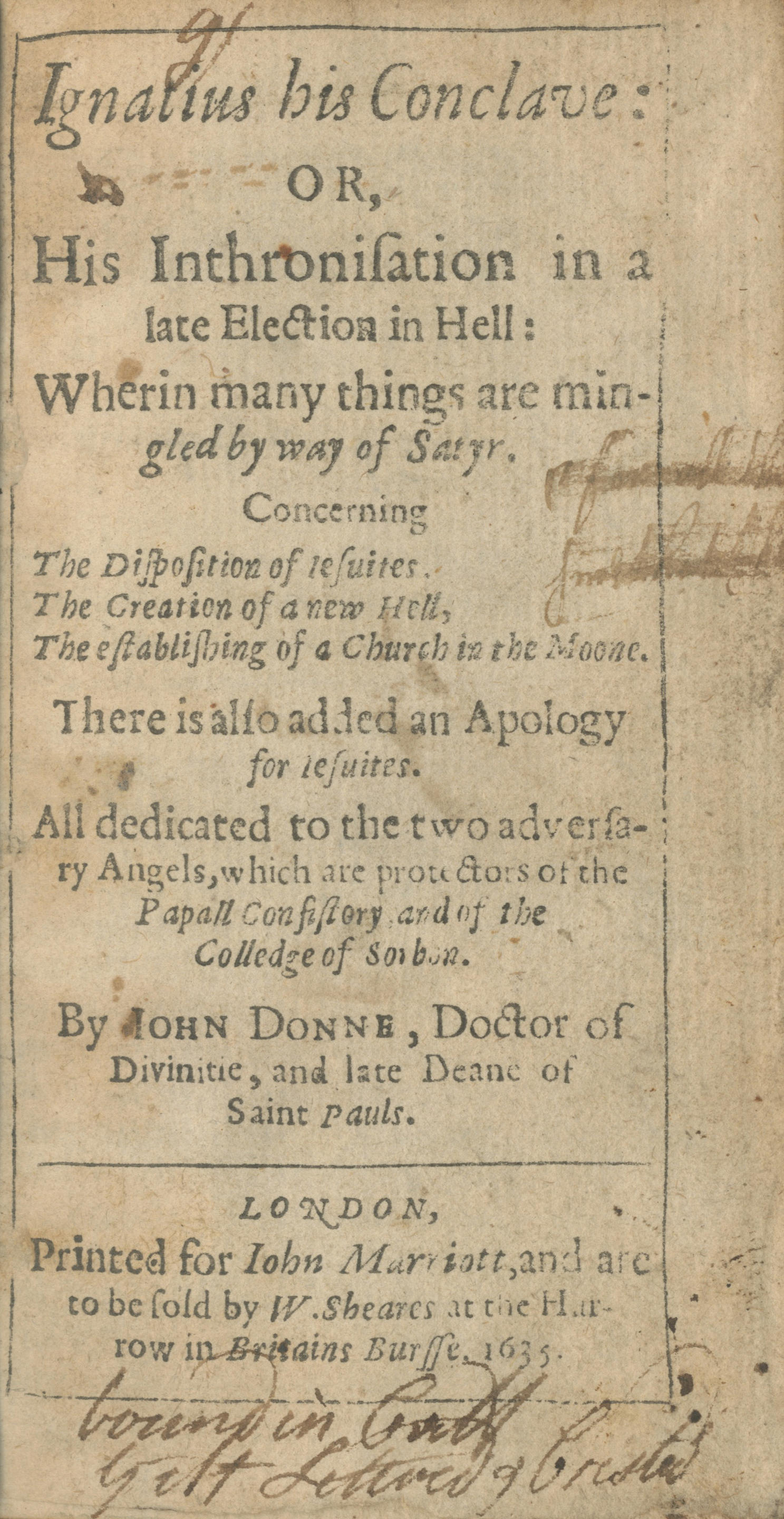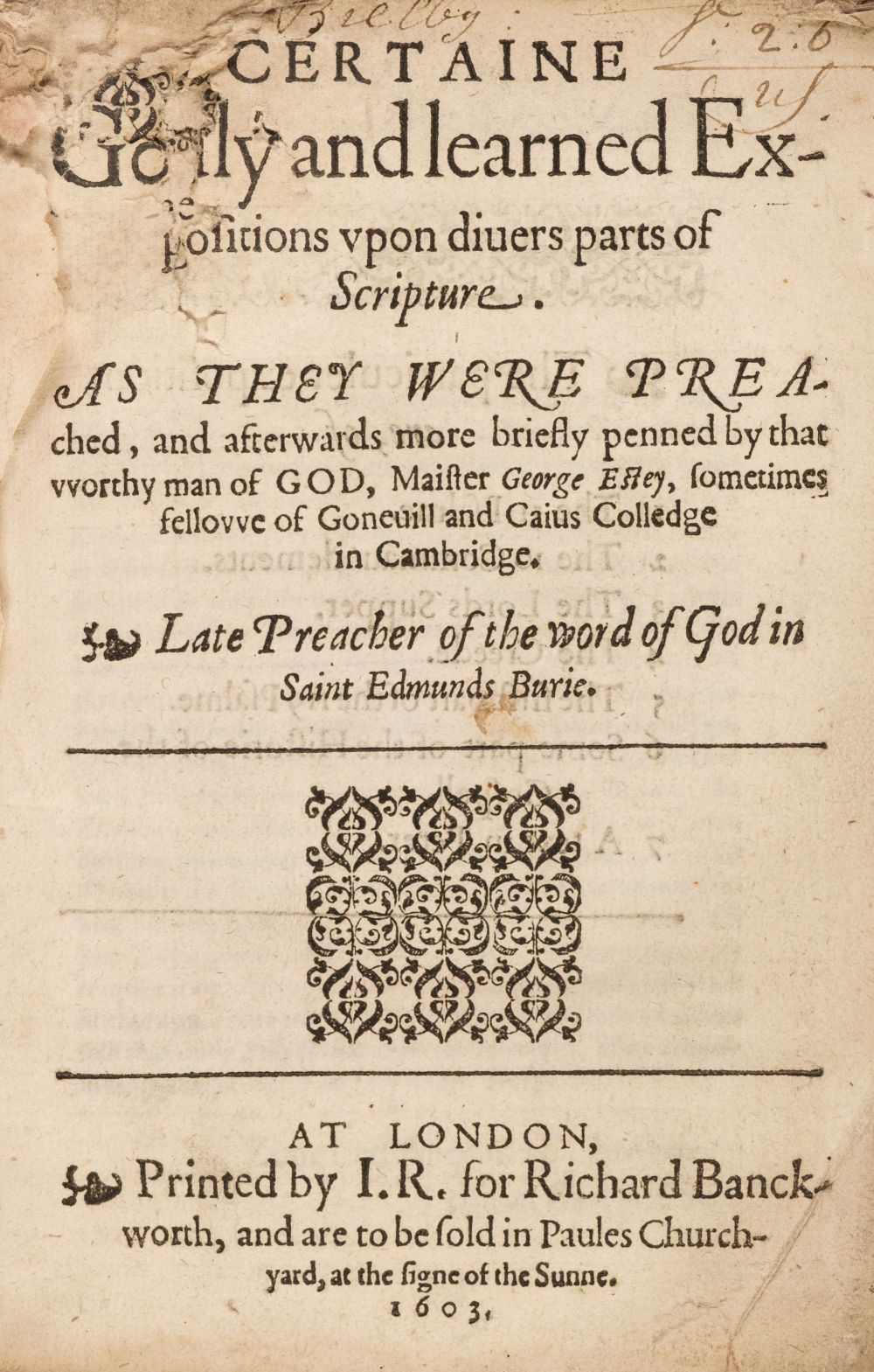DONNE, John (1572-1631). Manuscript copy, [c.1612-14], of his earliest extant verse collection, comprising 'Johon [sic] Donne his Satires' (1st to 5th), 'A Storme' and 'The Calme', transcribed in a neat, educated hand on ff.4-14 (brief lacunae in two lines of Satires 2 and 5, seven words in total, evidently from illegibility in the exemplar); the same hand has also transcribed Robert Speed's burlesque poem 'The Counter Skuffle' (ff.15-16), the scurrilous Catholic tract Leicester's Commonwealth (ff.18-36) and an untitled account of the life and death of Henry, Prince of Wales, including a day-by-day account of the prince's last illness in October-November 1612 (ff.39-48); a late 17th-century hand (probably Sir Michael Heneage) has added a further text, Sir Henry Wotton's 'Of Robert Devereux Earle of Essex and George Villers Duke of Buckingham some observations by waye of Parallel in the time of their estate of favour' (ff.52-83, rectos only), as well as some accounts, dated June 1692, on the concluding leaves, 4to (240 x 173mm), (old water-staining, some fraying at margins, the first few quires dog-eared at upper corner), contemporary limp vellum (cockled, sprung). Provenance : The Wotton text appears to be in the hand of Sir Michael Heneage, knight, of Gray's Inn (d.1711): his ownership inscription ('Mich: Hen[n]eage: A Paris') is on the front endpaper, and the upper cover is inscribed (in a different hand) 'Michael Heneage'; one may guess that the Donne transcriptions might be in the hand of Michael's father, Thomas Heneage (1581-1641). DONNE'S EARLIEST KNOWN 'BOOK'. An epigram of Thomas Freeman addressed 'To John Dunne', published in his Rubbe, and a Great Cast. Epigrams in 1614, makes it clear that the present group of poems, all written in the 1590s, were circulating by that date as a distinct 'book', and strongly implies that they were at that stage the only collection of Donne's verse in circulation: 'The Storme describ'd, hath set thy name afloate, Thy Calme, a gale of famous winde hat got: Thy Satyres short, too soone we them o'relooke, I prethee Persius write a bigger booke'. The present manuscript, which (on the evidence of the description of the death of Henry, Prince of Wales) must be closely contemporary with Freeman's epigram, is one of only four manuscripts of this seminal collection recorded by Peter Beal ( Index of English Literary Manuscripts (1980), vol. I, pt.I, p.254, no.34), and the only one in private hands (the others in the British Library, Queen's College, Oxford and the V&A). The accompanying texts by the same copyist pleasingly situate the reception of Donne's poems in a worldly, Catholic context appropriate to his early career.
DONNE, John (1572-1631). Manuscript copy, [c.1612-14], of his earliest extant verse collection, comprising 'Johon [sic] Donne his Satires' (1st to 5th), 'A Storme' and 'The Calme', transcribed in a neat, educated hand on ff.4-14 (brief lacunae in two lines of Satires 2 and 5, seven words in total, evidently from illegibility in the exemplar); the same hand has also transcribed Robert Speed's burlesque poem 'The Counter Skuffle' (ff.15-16), the scurrilous Catholic tract Leicester's Commonwealth (ff.18-36) and an untitled account of the life and death of Henry, Prince of Wales, including a day-by-day account of the prince's last illness in October-November 1612 (ff.39-48); a late 17th-century hand (probably Sir Michael Heneage) has added a further text, Sir Henry Wotton's 'Of Robert Devereux Earle of Essex and George Villers Duke of Buckingham some observations by waye of Parallel in the time of their estate of favour' (ff.52-83, rectos only), as well as some accounts, dated June 1692, on the concluding leaves, 4to (240 x 173mm), (old water-staining, some fraying at margins, the first few quires dog-eared at upper corner), contemporary limp vellum (cockled, sprung). Provenance : The Wotton text appears to be in the hand of Sir Michael Heneage, knight, of Gray's Inn (d.1711): his ownership inscription ('Mich: Hen[n]eage: A Paris') is on the front endpaper, and the upper cover is inscribed (in a different hand) 'Michael Heneage'; one may guess that the Donne transcriptions might be in the hand of Michael's father, Thomas Heneage (1581-1641). DONNE'S EARLIEST KNOWN 'BOOK'. An epigram of Thomas Freeman addressed 'To John Dunne', published in his Rubbe, and a Great Cast. Epigrams in 1614, makes it clear that the present group of poems, all written in the 1590s, were circulating by that date as a distinct 'book', and strongly implies that they were at that stage the only collection of Donne's verse in circulation: 'The Storme describ'd, hath set thy name afloate, Thy Calme, a gale of famous winde hat got: Thy Satyres short, too soone we them o'relooke, I prethee Persius write a bigger booke'. The present manuscript, which (on the evidence of the description of the death of Henry, Prince of Wales) must be closely contemporary with Freeman's epigram, is one of only four manuscripts of this seminal collection recorded by Peter Beal ( Index of English Literary Manuscripts (1980), vol. I, pt.I, p.254, no.34), and the only one in private hands (the others in the British Library, Queen's College, Oxford and the V&A). The accompanying texts by the same copyist pleasingly situate the reception of Donne's poems in a worldly, Catholic context appropriate to his early career.
DONNE, John (1572-1631). Manuscript copy, [c.1612-14], of his earliest extant verse collection, comprising 'Johon [sic] Donne his Satires' (1st to 5th), 'A Storme' and 'The Calme', transcribed in a neat, educated hand on ff.4-14 (brief lacunae in two lines of Satires 2 and 5, seven words in total, evidently from illegibility in the exemplar); the same hand has also transcribed Robert Speed's burlesque poem 'The Counter Skuffle' (ff.15-16), the scurrilous Catholic tract Leicester's Commonwealth (ff.18-36) and an untitled account of the life and death of Henry, Prince of Wales, including a day-by-day account of the prince's last illness in October-November 1612 (ff.39-48); a late 17th-century hand (probably Sir Michael Heneage) has added a further text, Sir Henry Wotton's 'Of Robert Devereux Earle of Essex and George Villers Duke of Buckingham some observations by waye of Parallel in the time of their estate of favour' (ff.52-83, rectos only), as well as some accounts, dated June 1692, on the concluding leaves, 4to (240 x 173mm), (old water-staining, some fraying at margins, the first few quires dog-eared at upper corner), contemporary limp vellum (cockled, sprung). Provenance : The Wotton text appears to be in the hand of Sir Michael Heneage, knight, of Gray's Inn (d.1711): his ownership inscription ('Mich: Hen[n]eage: A Paris') is on the front endpaper, and the upper cover is inscribed (in a different hand) 'Michael Heneage'; one may guess that the Donne transcriptions might be in the hand of Michael's father, Thomas Heneage (1581-1641). DONNE'S EARLIEST KNOWN 'BOOK'. An epigram of Thomas Freeman addressed 'To John Dunne', published in his Rubbe, and a Great Cast. Epigrams in 1614, makes it clear that the present group of poems, all written in the 1590s, were circulating by that date as a distinct 'book', and strongly implies that they were at that stage the only collection of Donne's verse in circulation: 'The Storme describ'd, hath set thy name afloate, Thy Calme, a gale of famous winde hat got: Thy Satyres short, too soone we them o'relooke, I prethee Persius write a bigger booke'. The present manuscript, which (on the evidence of the description of the death of Henry, Prince of Wales) must be closely contemporary with Freeman's epigram, is one of only four manuscripts of this seminal collection recorded by Peter Beal ( Index of English Literary Manuscripts (1980), vol. I, pt.I, p.254, no.34), and the only one in private hands (the others in the British Library, Queen's College, Oxford and the V&A). The accompanying texts by the same copyist pleasingly situate the reception of Donne's poems in a worldly, Catholic context appropriate to his early career.
DONNE, John (1572-1631). Manuscript copy, [c.1612-14], of his earliest extant verse collection, comprising 'Johon [sic] Donne his Satires' (1st to 5th), 'A Storme' and 'The Calme', transcribed in a neat, educated hand on ff.4-14 (brief lacunae in two lines of Satires 2 and 5, seven words in total, evidently from illegibility in the exemplar); the same hand has also transcribed Robert Speed's burlesque poem 'The Counter Skuffle' (ff.15-16), the scurrilous Catholic tract Leicester's Commonwealth (ff.18-36) and an untitled account of the life and death of Henry, Prince of Wales, including a day-by-day account of the prince's last illness in October-November 1612 (ff.39-48); a late 17th-century hand (probably Sir Michael Heneage) has added a further text, Sir Henry Wotton's 'Of Robert Devereux Earle of Essex and George Villers Duke of Buckingham some observations by waye of Parallel in the time of their estate of favour' (ff.52-83, rectos only), as well as some accounts, dated June 1692, on the concluding leaves, 4to (240 x 173mm), (old water-staining, some fraying at margins, the first few quires dog-eared at upper corner), contemporary limp vellum (cockled, sprung). Provenance : The Wotton text appears to be in the hand of Sir Michael Heneage, knight, of Gray's Inn (d.1711): his ownership inscription ('Mich: Hen[n]eage: A Paris') is on the front endpaper, and the upper cover is inscribed (in a different hand) 'Michael Heneage'; one may guess that the Donne transcriptions might be in the hand of Michael's father, Thomas Heneage (1581-1641). DONNE'S EARLIEST KNOWN 'BOOK'. An epigram of Thomas Freeman addressed 'To John Dunne', published in his Rubbe, and a Great Cast. Epigrams in 1614, makes it clear that the present group of poems, all written in the 1590s, were circulating by that date as a distinct 'book', and strongly implies that they were at that stage the only collection of Donne's verse in circulation: 'The Storme describ'd, hath set thy name afloate, Thy Calme, a gale of famous winde hat got: Thy Satyres short, too soone we them o'relooke, I prethee Persius write a bigger booke'. The present manuscript, which (on the evidence of the description of the death of Henry, Prince of Wales) must be closely contemporary with Freeman's epigram, is one of only four manuscripts of this seminal collection recorded by Peter Beal ( Index of English Literary Manuscripts (1980), vol. I, pt.I, p.254, no.34), and the only one in private hands (the others in the British Library, Queen's College, Oxford and the V&A). The accompanying texts by the same copyist pleasingly situate the reception of Donne's poems in a worldly, Catholic context appropriate to his early career.






.jpg)


.jpg)
.jpg)

.jpg)


Try LotSearch and its premium features for 7 days - without any costs!
Be notified automatically about new items in upcoming auctions.
Create an alert